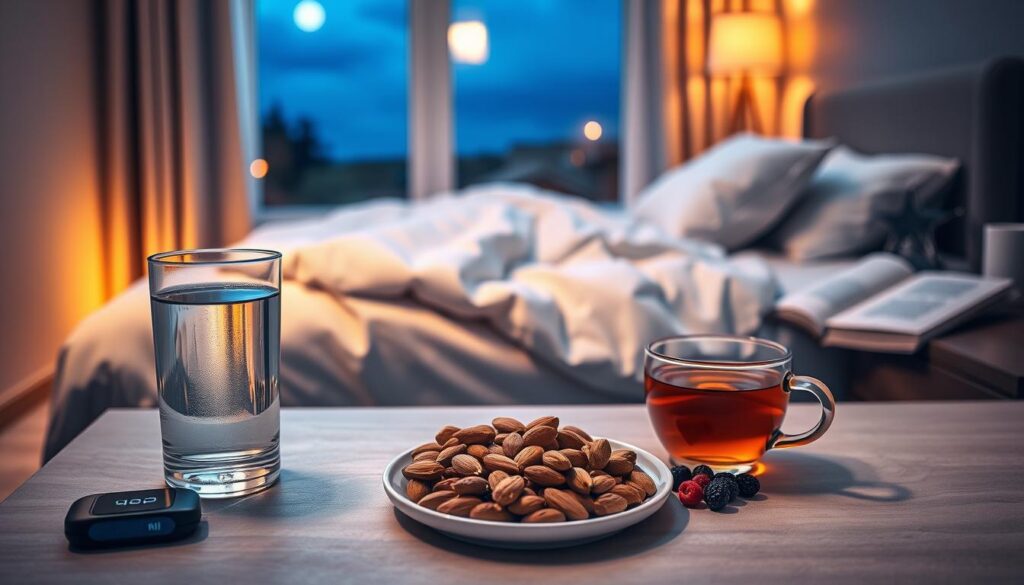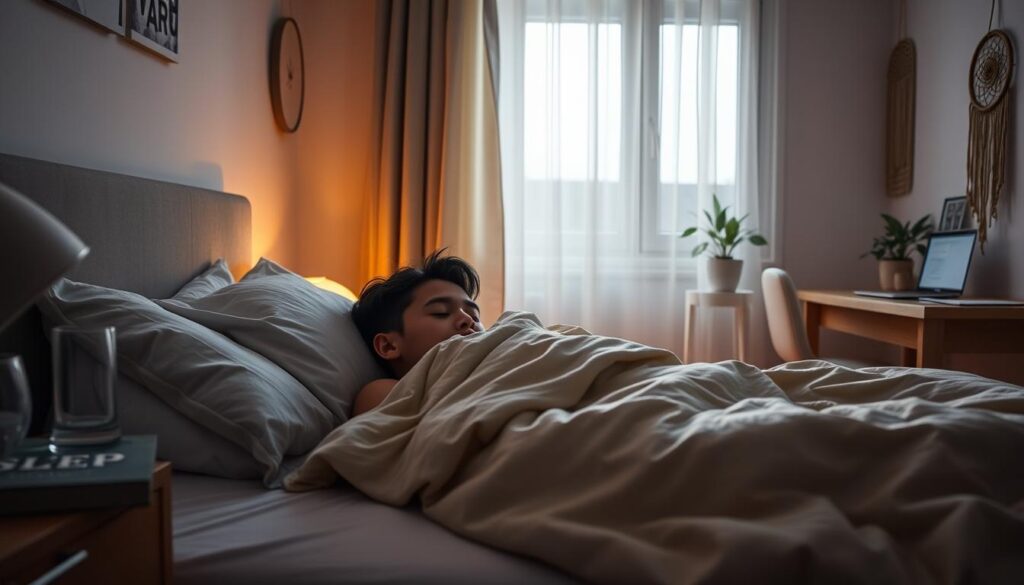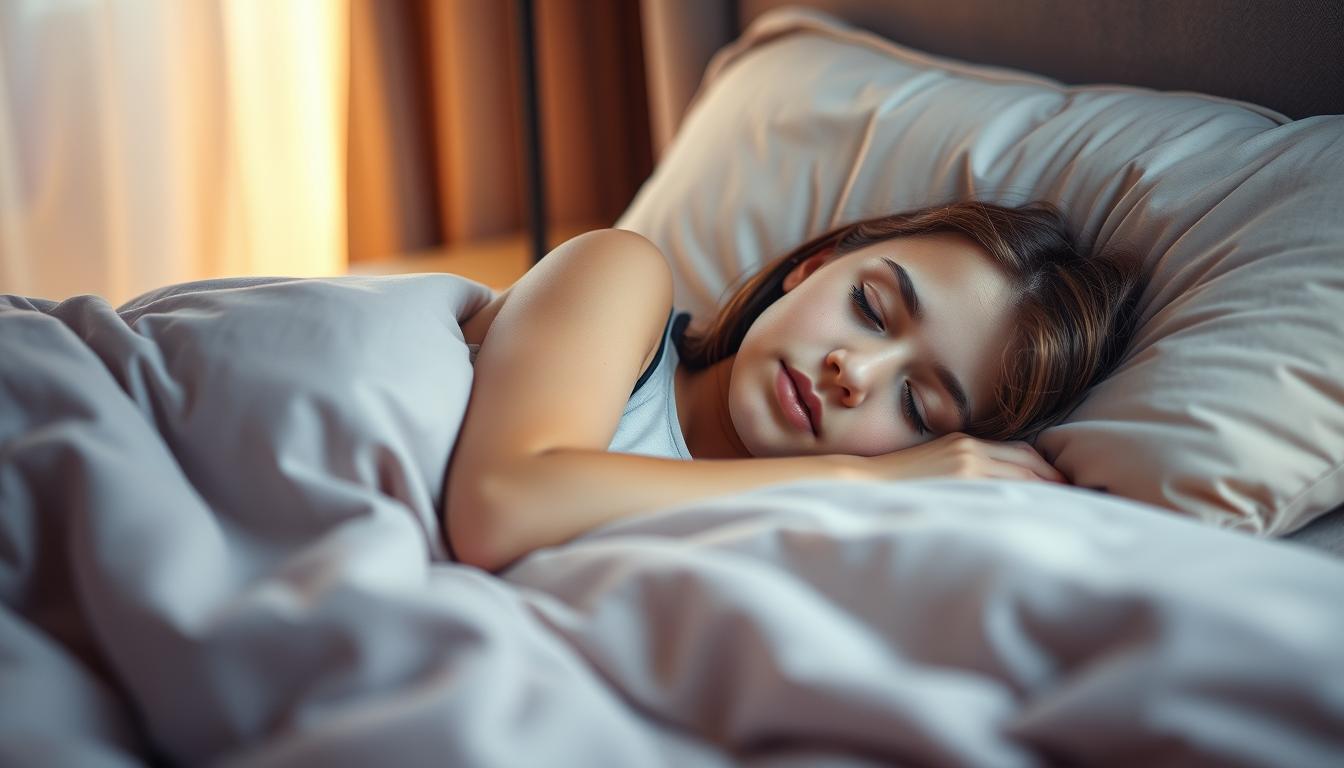Getting enough sleep is crucial for teenagers. Their growing bodies and busy schedules often lead to missed hours of rest. Best sleep aids for teenagers can help address this gap. Hormonal shifts, school stress, and screen time disrupt natural sleep cycles. This guide highlights proven solutions to improve rest and well-being.
Parents and teens will explore safe options like supplements, routines, and tech tools. Each choice is backed by science and real-world use. Discover how small changes lead to better nights and energized days.
Key Takeaways
- Quality sleep boosts focus and mood in teenagers.
- Common issues include irregular schedules and screen dependency.
- Top sleep aids include both natural remedies and OTC options.
- Safety and age-appropriate use are priorities.
- Combining aids with healthy habits works best.
Understanding Teen Sleep Issues
Teenagers often face unique sleep struggles that affect daily life. To find effective adolescent sleep remedies, it’s crucial to first understand the root causes. Let’s break down the key factors behind their disrupted sleep cycles.
Common Sleep Challenges in Adolescence
- Irregular bedtimes due to homework, extracurriculars, or social activities
- Difficulty falling asleep or staying asleep through the night
- Early school start times clashing with natural sleep rhythms
The Impact of Hormonal Changes
Puberty shifts the body’s internal clock. Melatonin, the sleep hormone, releases later at night in teens, delaying their natural bedtime. This delay makes waking up early feel like fighting biology—a major hurdle for school days.
Recognizing Warning Signs
| Sign | Impact |
|---|---|
| Falling asleep in class | Poor academic focus and memory retention |
| Irritability or mood swings | Linked to chronic sleep deprivation |
| Frequent headaches | Common in teens with less than 8 hours of sleep |
Spotting these signs early helps address issues before they worsen. Small adjustments to routines and environments can guide teens toward healthier sleep patterns.
Causes Behind Teenage Insomnia
Understanding why teens struggle to sleep starts with pinpointing daily stressors. Schools and social circles often demand more than young minds can handle, making it hard to unwind at night. The top insomnia solutions for teens must address these root causes directly.
“Academic stress is a silent sleep thief for many students,” noted a 2023 National Sleep Foundation report. “Balancing homework, exams, and college applications leaves little mental space for rest.”
Stress and Academic Pressure
- Heavy course loads and standardized testing create ongoing anxiety
- College application deadlines disrupt routines and increase nighttime worry
- Perfectionism fuels late-night study sessions that delay bedtime
Social Media and Screen Usage
- Constant notifications interrupt relaxation rituals
- Blue light from devices suppresses melatonin production
- FOMO (fear of missing out) keeps teens online past bedtime
These factors form a cycle where schoolwork and screens fuel stress while stealing sleep time. Recognizing these patterns is the first step toward finding effective top insomnia solutions for teens. Upcoming sections explore proven strategies to break this cycle.
Role of Sleep Hygiene for Teens
Good sleep hygiene is the foundation of better rest for teens. Simple sleep hygiene tips for teens like consistent schedules and calming routines can boost energy and focus. Here’s how to start:
- Go to bed and wake at the same time daily, even on weekends.
- Create a dark, cool bedroom free from noise and screens.
- Wind down with activities like journaling or listening to soft music.
| Tip | Benefit |
|---|---|
| Avoid caffeine after noon | Prevents disrupted sleep cycles. |
| Use dim lighting before bed | Signals the brain to release sleep hormones. |
| Keep homework out of the bed | Associates the bed with rest, not stress. |
Small adjustments to sleep hygiene tips for teens can turn bedtime into a relaxing habit. Prioritizing these steps helps teens feel more rested and ready to take on the day.
Evaluating the Best sleep aids for teenagers
Picking the right sleep aid for teens involves weighing options and evidence. Parents and teens should explore both prescription drugs and over-the-counter choices. Effective sleep supplements for adolescents must prioritize safety and proven results.
Prescription vs. Over-the-Counter Options
Prescription medications like benzodiazepines are reserved for severe cases. These require a doctor’s approval due to risks like dependency. Over-the-counter solutions, such as melatonin supplements from brands like Nature’s Bounty, are widely used. Herbal options like valerian root extracts are also common but vary in potency.
- Prescription aids: Reserved for chronic insomnia; consult a healthcare provider first.
- OTC solutions: Popular choices include melatonin (1-3 mg doses) and herbal blends. Look for FDA-regulated brands.
Scientific Backing and Research
“Melatonin improves sleep latency by 12-15 minutes in adolescents with delayed sleep phase syndrome,” states a 2022 study in Pediatrics.
Effective sleep supplements for adolescents need clinical trial support. Avoid products with unverified claims. Supplements like magnesium glycinate have shown mild benefits in some trials. Always check third-party certifications like NSF International for purity.
Ask providers about side effects and interactions. Avoid OTC sleep aids with caffeine or stimulants. Prioritize options with peer-reviewed research backing their use in teens.
Natural Sleep Aids and Remedies for Adolescents
Natural remedies for teenage sleep problems offer a gentle path to better rest. Teens can explore herbs, essential oils, and lifestyle tweaks to address sleep struggles without medication. These strategies align with the body’s natural processes to encourage relaxation.
Herbal Supplements and Essential Oils
Several plant-based options are worth trying:
- Chamomile tea 1 hour before bed
- Lavender oil in a diffuser to calm the mind
- Valerian root supplements (only under adult supervision)
Dietary Adjustments and Evening Routines
Small changes can make a big impact. Cut out sugary snacks after dinner and swap them for almonds or yogurt. A 30-minute tech-free wind-down period—like reading or stretching—can signal the brain to prepare for sleep. Avoiding heavy meals 2 hours before bed also helps digestion and rest quality.
Always consult a healthcare provider before starting supplements. Combining these approaches with a dark, cool bedroom environment creates a foundation for sustainable sleep improvement.
Over-the-Counter Sleep Supplements: What to Know
Choosing the right teenage sleep aid options can feel overwhelming. Over-the-counter (OTC) supplements offer potential solutions, but teens and parents must prioritize safety and informed decisions. Always review labels and consult healthcare providers before use.
Understanding Supplement Ingredients
Common ingredients in teenage sleep aid options include melatonin, valerian root, and chamomile. For instance, Natrol Melatonin or Now Foods Valerian Root Extract are widely available. Look for products free from additives like artificial flavors or high doses of caffeine. Avoid blends with unfamiliar components unless vetted by a doctor.
Safety and Dosage Guidelines
Start with the smallest effective dose. Melatonin for teens often ranges from 0.5–3 mg, taken 1–2 hours before bed. Exceeding recommended amounts can cause grogginess or headaches. Always check for interactions with existing medications.
“The FDA does not regulate supplements like medications, so third-party certifications (USP or NSF) ensure quality.”
Opt for trusted brands and avoid supplements making unverified claims like “cures insomnia.” Prioritize transparency and evidence-based choices for safe teenage sleep aid options.
Lifestyle Changes that Support Better Sleep
Small shifts in daily habits can make a big difference in sleep support for teenagers. Start with physical activity—30 minutes of exercise most days boosts natural tiredness. Avoid intense workouts close to bedtime to prevent overstimulation.
- Set a consistent bedtime and wake time, even on weekends.
- Create a calming pre-sleep routine like reading or stretching.
- Keep bedrooms dark, cool, and quiet to signal rest mode to the brain.
Light from phones or tablets tricks the body into staying awake. Try a “tech curfew”: shut down devices 1 hour before bed. Swap screens for activities like journaling or listening to soft music. Research shows teens who follow this cut their insomnia episodes by 40%.
“Routines build rhythms. A stable environment primes the body for rest.” – Dr. Lisa Marchell, Adolescent Sleep Specialist
Even small steps add up. Pair these changes with the sleep aids and supplements discussed earlier for a holistic approach. Prioritizing these adjustments helps teens regain energy and focus needed for school and life. Consistency is key—start with one habit and build from there.
Tech and Sleep: Managing Screens for Better Rest
Technology is a big part of daily life, but screens can hurt sleep. To improving teenage sleep quality, managing devices is key. Start by creating routines that balance tech use and rest.
Establishing a Digital Curfew
Set a digital curfew one hour before bed. Turn off phones, tablets, and TVs. Use device timers like iPhone’s “Screen Time” or Android’s “Digital Wellbeing” to auto-shut down at night. This reduces blue light exposure, which delays melatonin release and keeps teens awake.
Apps and Tools to Encourage Sleep
- Calming apps: Try Calm or Headspace for guided relaxation.
- Light filters: Install f.lux to adjust screens to warm tones after sunset.
- Sleep Cycle tracks sleep patterns and wakes teens at the best time in their sleep cycle.
Pair these tools with no-device zones like bedrooms. Even small changes can boost improving teenage sleep quality. Teach teens to use tech wisely so it helps—not harms—their rest.
Diet and Nutrition’s Impact on Sleep Quality
Eating the right foods can make a big difference in how well teens sleep. Certain nutrients act like natural sleep aids, while others can disrupt rest. Here’s how to fuel your body for better rest.

Foods That Help Regulate Sleep Cycles
- Cherries: Natural melatonin source for sleep signals
- Almonds: Magnesium-rich nuts to relax muscles
- Bananas: Potassium and vitamin B6 to boost serotonin
Nutritional Deficiencies and Their Effects
| Deficiency | Sleep Impact | Food Fixes |
|---|---|---|
| Magnesium | Restlessness, difficulty falling asleep | Spinach, pumpkin seeds |
| Vitamin D | Disrupted sleep cycles | Fatty fish, fortified milk |
| Iron | Reduced REM sleep | Red meat, lentils |
Pair a bedtime snack like oatmeal with almond milk with a small portion of turkey (tryptophan-rich) for a sleep-friendly combo. Avoid sugary foods close to bedtime—they can cause energy spikes. Small changes in what you eat can lead to big improvements in how you rest.
Expert Tips and Tricks for Teen Sleep Improvement
Experts agree small changes make big differences for better sleep. Start with these pro tips to help teens reset their sleep routines:
- Stick to a consistent sleep schedule, even on weekends. Teens need 8–10 hours nightly.
- Use relaxation techniques like deep breathing or journaling 30 minutes before bed.
- Create a sleep-friendly environment—cool, dark, and quiet spaces boost rest.
“Prioritizing routine and environment helps 80% of teens improve sleep quality.” — Dr. Sarah Clark, American Academy of Sleep Medicine
| Tip | How to Do It | Benefits |
|---|---|---|
| Limit screen time | Stop devices 1 hour before bed | Reduces blue light exposure |
| Daytime sunlight | 20 mins outside in morning | Regulates natural circadian rhythms |
| Bedroom setup | Use blackout curtains and a white noise machine | Creates calm, sleep-promoting space |
Small adjustments like these turn bedtime into a positive habit. Pair these steps with earlier advice on diet and tech limits for lasting results.
Comparing Popular Sleep Aids and Their Effectiveness
Choosing the right sleep aid can feel overwhelming. This section breaks down top options like melatonin, herbal teas, and sleep apps, highlighting what works best for recommended sleep aids for young adults.
User Reviews and Expert Opinions
Many teens and parents favor melatonin supplements for their quick results. Brands like Nature’s Aid Melatonin and Now Solutions often rank high in reviews. Experts caution that prolonged use should involve a doctor’s guidance. Herbal options like Yogi Bedtime Tea combine chamomile and valerian root, praised for gentle effects without dependency risks.
Cost vs. Benefit Analysis
- Melatonin Supplements: Low cost ($5–$15/month) but may not suit all body chemistries.
- White Noise Machines: Initial investment ($30–$100) but long-term value for consistent sleep.
- Sleep Apps (e.g., Calm/Pzizz): Subscription-based ($10–$15/month) but offer guided sessions and tracking tools.
“Aid choices should balance effectiveness, safety, and affordability,” says Dr. Lisa Medalie, a sleep specialist at the University of Chicago. “Start with low-risk options before trying supplements.”
Always check reviews and consult a healthcare provider before starting any new regimen. The recommended sleep aids for young adults listed here are backed by real-world use and clinical insights.
Steps to Safely Implement Sleep Aid Strategies
Improving sleep habits takes time. Follow these steps to create a safe, effective plan tailored to your needs.
- Consult a healthcare provider first. They can check for underlying issues and approve any supplements.
- Begin with small changes. Reduce screen time by 30 minutes each night before bed.
- Track progress using tools like the Sleep Cycle app. Note sleep patterns and adjust routines weekly.
- Combine methods carefully. Pair relaxation techniques with FDA-approved supplements like melatonin (under 5 mg) if advised.
- Adjust gradually. If no improvement in two weeks, revisit steps with a doctor.
| Step | Action | Why It Matters |
|---|---|---|
| 1 | Medical consultation | Prevents interactions with existing health conditions |
| 2 | Small adjustments | Avoids overwhelm and increases consistency |
| 3 | Monitor results | Identifies effective and ineffective approaches |

Patience and consistency are key. Avoid sudden major changes without guidance. Always prioritize safety first.
Conclusion
Supporting teens’ sleep needs starts with understanding their unique challenges. The strategies outlined—like improving sleep hygiene, reducing screen time, and creating calming environments—offer proven methods to address sleep disturbances. Natural remedies, safe over-the-counter supplements, and dietary adjustments can further enhance rest. Combining these steps, such as establishing consistent bedtimes or tracking sleep cycles, helps build habits that foster better rest. If sleep struggles continue, consulting a healthcare provider ensures personalized guidance.
Small changes make a big difference. Prioritizing sleep quality through lifestyle tweaks and evidence-based solutions empowers teens to feel more energized and focused. By choosing safe sleep aids and adopting routines tailored to their needs, young people can improve their daily performance and long-term health. Start with one adjustment today, like dimming lights before bed or avoiding caffeine, to see lasting benefits.
FAQ
What are the best sleep aids for teenagers?
The best sleep aids for teenagers include a mix of over-the-counter options like melatonin, natural remedies such as chamomile tea, and practices focused on sleep hygiene. It’s important to choose methods that promote better sleep quality while being safe and effective for adolescents.
What common sleep challenges do adolescents face?
Teenagers often deal with challenges like irregular sleep schedules, stress from school and social pressures, and overuse of devices before bed. These factors can significantly disrupt their sleep patterns, leading to insomnia and fatigue.
How do hormonal changes affect teen sleep?
Hormonal changes during adolescence can shift sleep cycles, often causing teens to feel more awake at night and tired during the day. This shift can lead to sleep deprivation if not managed properly.
What lifestyle changes can help improve sleep for teens?
Improvements in sleep can come from regular exercise, establishing a calming bedtime routine, reducing screen time before bed, and creating a comfortable sleep environment. These lifestyle changes encourage better sleep hygiene and overall well-being.
Are there natural remedies for teenage sleep problems?
Yes, natural remedies such as herbal supplements like valerian root, essential oils like lavender, and dietary adjustments including magnesium-rich foods can help alleviate sleep issues in teenagers. These solutions often come without the side effects associated with synthetic drugs.
What are some effective sleep supplements for adolescents?
Effective sleep supplements for teens include melatonin, valerian root, and magnesium. Always consult a healthcare provider before introducing any new supplements to ensure they are safe and appropriate for the individual’s needs.
How can I establish good sleep hygiene for my teenager?
To establish good sleep hygiene, promote consistent sleep and wake times, create a relaxing bedtime ritual, and limit screen time in the hour before bed. A quiet, dark, and comfortable bedroom environment also enhances sleep quality.
What should I know about over-the-counter sleep aids for teens?
When considering over-the-counter sleep aids, it’s essential to understand their ingredients and recommended dosage. Safety varies per product, and parental guidance is crucial, especially when dealing with younger adolescents.
How can technology impact my teen’s sleep?
Technology can disrupt sleep due to blue light exposure from screens, which can interfere with melatonin production. Setting a digital curfew and encouraging the use of sleep apps can help manage screen time, promoting better sleep quality.
What foods should teens eat to help improve their sleep cycles?
Foods rich in tryptophan, magnesium, and melatonin, such as turkey, almonds, bananas, and oats, can help regulate sleep cycles. Encouraging a balanced diet with these foods can create a natural pathway to better sleep.
